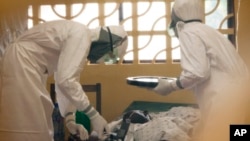The Ebola outbreak in West Africa has so far claimed 670 lives and infected more than 1,200 people. An expert from the U.S. Centers for Disease Control and Prevention says more cases can be expected in the coming weeks and months. Tealth agency is actively trying to stem the spread of the infection.
The U.S. Centers for Disease Control, or CDC, downplays concerns that the Ebola virus could spread in the U.S., because of the practices already in place in most U.S. hospitals. Two American health care workers in Africa have contracted the disease.
In the past, the strain of Ebola that's circulating in Guinea, Sierra Leone and Liberia has killed 90 percent of those who got sick. The CDC says the death rate for the current outbreak is around 60 percent, a figure experts claim shows that early treatment is having an impact.
Experts from the CDC are in West Africa, where they are working with the ministries of health and international health organizations to help keep track of the outbreak and coordinate resources to deal with it. The CDC's Stephan Monroe monitors emerging diseases. He spoke during a teleconference from the CDC's headquarters in Atlanta, Georgia.
"We know how to stop the outbreak and that is to break the chains of transmission. What does that involve? It involves first identifying cases through active case findings, and then identifying all of their contacts [people] who had contact with them during the time when they were symptomatic, and therefore are at risk of becoming infected themselves, and following those contacts daily for 21 days and if they do develop symptoms to get them into one of these isolation facilities," said Monroe.
Monroe says fear and misinformation are major factors in preventing people from seeking treatment. He said what the CDC and health organizations are trying to do is find trusted members of the affected communities to get the word out about how to contain the disease.
There are no specific drugs to treat Ebola. What health care workers can do is provide fluids and treat the early symptoms, which include high fever, muscle aches, vomiting and diarrhea. The symptoms could also be mistaken for influenza or malaria, and unless patients are isolated and care givers avoid contact with the patient's blood, saliva or other bodily fluids, the disease can spread.




